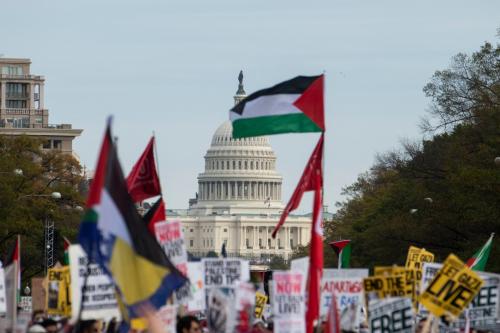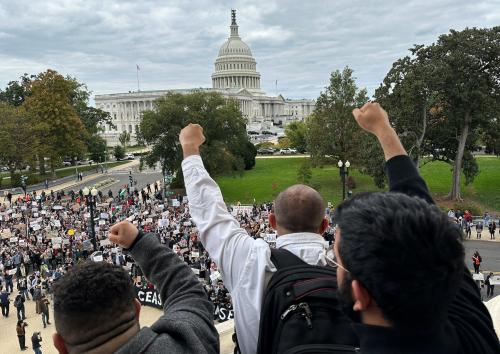Nearly a month into the war that began with the Hamas invasion of Israel, overall public opinion in favor of the United States’ support of Israel remains strong. But as recent demonstrations on college campuses around the country indicate, there is a generational divide. Even before the Hamas invasion, there were distinct generational differences in Americans’ attitudes towards Israel. These differences are mirrored by divergences between older and younger Jewish Americans. There are signs that these gaps have widened since the current conflict began. As the following polling from 2022 shows, older Americans have more favorable attitudes towards Israel than younger ones. A 2022 Pew survey found that 55% of Americans had a favorable view of Israel, while 41% had an unfavorable view. But a breakdown of these results reveals key generational and partisan differences. For example, only 41% of those aged 18-29 had a favorable view of Israel, compared to 69% of those aged 65 or older. Among those aged 30-49, 49% held a favorable view of Israel, and among 50–64-year old’s, 60% held a favorable view. Moreover, 71% of Republicans hold a favorable view of Israel, compared to only 44% of Democrats.
In March of 2023, Gallup found that Democratic sympathies in the Middle East now lie more with the Palestinians than the Israelis, 49% versus 38%.
There was a clear generational gap. Israel saw a net positive sympathy level of +46% among baby boomers (born 1946-1964), and +32% among Generation X (born 1965-1979). However, there was a massive drop-off among millennials (born 1980-2000) where net sympathy for Israel versus Palestinians was -2%.
In 2022, Pew found that among U.S. adults, opinions of the Israeli and Palestinian people scored significantly higher than the opinions of their governments. For example, a majority of those polled (52%) held a positive opinion of the Palestinian people, while only 28% held a positive opinion of the Palestinian government. A similar gap in support was seen for Israel as well with 67% holding a positive opinion of the Israeli people and 48% feeling the same way about their government.
Here as with other questions, generational differences were significant. Sixty-one percent of those aged 18-29 held a positive view of the Palestinian people, compared to 56% who were favorable towards the Israeli people. Among 30–49-year old’s, 65% felt favorable towards the Israeli people, compared to 55% towards the Palestinians. Among 50–64-year-olds, 68% felt positively about the Israeli people, and 45% felt positively about the Palestinian people. Finally, among the oldest demographic, those 65 and older, 78%, felt positively about the Israeli people, compared to 47% in that demographic feeling favorably towards the Palestinians.
Among those aged 18-29, 11% said they viewed the Israeli people favorably and the Palestinians unfavorably, compared to 17% who viewed the Israeli people unfavorably and the Palestinian people favorably. By contrast, among those in the 65+ demographic, 37% feel favorably towards the Israelis and not the Palestinians, while only 6% express the opposite sentiment.
Pew’s findings from 2020 among U.S. Jews continue the pattern that we’ve seen from overall U.S. polling. Sixty-seven percent of U.S. Jews aged 65 or older said they felt “very/somewhat attached to Israel,” compared to only 48% of those aged 18-29 who felt such a connection.
A survey commissioned by the Jewish Electorate Institute, a group led by prominent Jewish Democrats, found that 34% of Jewish respondents agreed that “Israel’s treatment of Palestinians is similar to racism in the United States,” 25% agreed that “Israel is an apartheid state,” and 22% agreed that “Israel is committing genocide against the Palestinians.” When broken down by age, 43% under 40 agreed that “Israel’s treatment of Palestinians is similar to racism in the United States,” among 40-to-64-year old’s 32% agreed with the statement, and among those over 64, 27% agreed. When prompted with the statement “Israel is an apartheid state,” 38% under 40 agreed, compared to 23% of those 40-64, and 13% of those over 64. Finally, the statement “Israel is committing genocide against the Palestinians” resulted in 33% of those under 40 agreeing, in contrast to 18% of those aged 40-64, and 15% of those over 64.
Additionally, the poll found that 9% of Jewish voters agreed with the statement, “Israel doesn’t have a right to exist.” Among voters under 40, that proportion was higher with 20% agreeing.
The JTA survey found that 61% of Jewish voters want a Jewish State of Israel alongside an independent Palestinian State, and the remaining two-in five are evenly split between a one-state solution (20 percent) and annexation (19 percent).
Interestingly, 62% of Jewish voters support the U.S. sending aid to the Palestinian people while only 28% oppose it, apparently demonstrating widespread acknowledgement of the plight of many Palestinian civilians.
Given this background, how might these findings change as the war progresses? A NewsNation/Decision Desk HQ poll of 1,000 registered voters was conducted on Oct. 23 and 24, just over two weeks after the Hamas invasion. It found that nearly half of Americans have more sympathy for Israel compared to just under 10% who felt more sympathy for the Palestinians. However, the picture is less clear when we look once more at the age gap.
An Economist/YouGov poll conducted between Oct. 21 and 24 demonstrates this. Somewhat more people in the youngest group, aged 18-29 sympathize with the Palestinians than with the Israelis (28%-20%), far different than among those 65 and over who support the Israelis by a margin of 65% to 6%.
An NPR/PBS NewsHour/Marist National poll from October 11 had similar findings. Only 48% of Millennial and Gen Z’ers said the U.S. government should support Israel, compared to 83% of baby boomers and 86% from the Silent and Greatest Generations. Notably, these findings are from the first days of the conflict. Since then, footage and accounts of Palestinian suffering has been widely circulated across traditional media and social media, the latter of which has the potential to shift already pro-Palestinian young adults more in this direction.
These generational and partisan differences influence views about public policy. In a recent poll, Quinnipiac University found while Americans 65 and older support sending more military aid to Israel by a margin of 46 points (69 to 23%), younger Americans are almost as strongly opposed, with only 29% in favor and 65% opposed. Similarly, Republicans support aid by a margin of 35 points (65 to 30%) while Democrats do so by only 6 points (49 to 43%).
There is a concern that unites Americans across generational and partisan lines. When a close ally of the United States is at war, many people wonder if we will soon be at war too. The Quinnipiac poll found that 84% of the public — from young to old and from Democrats to Independents and Republicans — fears that the United States will be drawn into a war in the Middle East. It remains to be seen how this concern will find political expression if the conflict continues for more than a few more weeks.
While some younger Americans are increasingly aware of the hardships that many Palestinians have had to endure, others are echoing long-standing anti-colonial narratives popular on the far left and calling, as does Hamas, for the outright destruction of Israel. At the same time, some young Jewish Americans feel distant from the story of Israel’s founding and the Jewish struggle to gain the recognition of a homeland, while also having to cope with a historic explosion of antisemitism. For many younger Americans, the current bloodshed is their first experience with a conflict that has been going on for more than 75 years. The coming months are likely to have a profound impact on the attitudes they will carry with them through their lives.
The Brookings Institution is committed to quality, independence, and impact.
We are supported by a diverse array of funders. In line with our values and policies, each Brookings publication represents the sole views of its author(s).









Commentary
The generation gap in opinions toward Israel
November 9, 2023